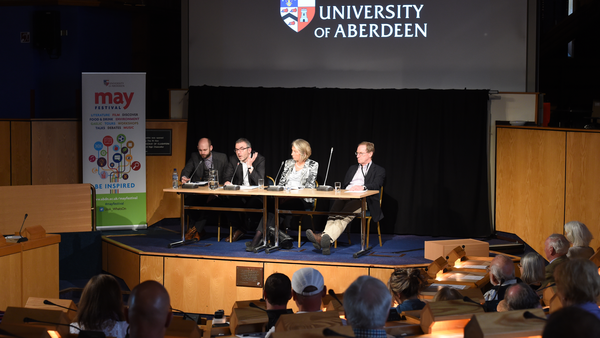Introduction
This programme draws in the University of Aberdeen’s expertise in international security and the energy sector to deliver detailed understanding of global energy security, in the context of how different countries and regions operate today.
This course has January and September start dates. Apply Now.
Study Information
Study Options
- Learning Mode
- On Campus Learning
- Degree Qualification
- MSc
- Duration
- 12 months or 24 months
- Study Mode
- Full Time or Part Time
- Start Month
- September or January
- Location of Study
- Aberdeen
The MSc Strategic Studies and Energy Security combines the study of national and internal security with courses in energy politics, energy economics and energy law to equip students with the practical skills needed to understand the character of international security as it relates to energy security.
The aim of this programme is to understand the costs and benefits of the strategies deployed, often of a military nature, to address energy security issues and to enhance our understanding of the difficulties encountered when attempting to assess the prospects for stability and security in key, pivotal 'energy-rich' and 'energy-poor' regions of the international system. In addition, you will study the enduring influence of certain core strategic issues, inherent in the management of power and coercion, on the international system regardless of levels of economic and social development.
The University of Aberdeen plays a central role in developing new technology across the energy sector while also works closely with industry, government and regulatory bodies in developing energy policy and frameworks. Our location at the heart of the Energy Capital of Europe means that our students benefit from direct industry involvement with our programmes.
Available Programmes of Study
- MSc
-
Strategic Studies and Energy Security
Qualification Duration Learning Mode Study Mode Start Month LocationMSc 12 months or 24 months On Campus Learning Full Time or Part Time January Aberdeen MoreMSc 12 months or 24 months On Campus Learning Full Time or Part Time September MoreProgramme Fees
Fee information Fee category Cost EU / International students £23,000 Tuition Fees for 2025/26 Academic Year UK £11,100 Tuition Fees for 2025/26 Academic Year Graduates of the University of Aberdeen are eligible for the Alumni Postgraduate Scholarship, which reduces the tuition fee to £7,000, in line with the current tuition fee loan amount offered by the Student Awards Agency Scotland (SAAS). Please see the following for full terms and conditions: https://www.abdn.ac.uk/study/funding/653
We will endeavour to make all course options available. However, these may be subject to change - see our Student Terms and Conditions page.
Fee Information
Additional Fee Information
- Fees for individual programmes can be viewed in the Programmes section above.
- In exceptional circumstances there may be additional fees associated with specialist courses, for example field trips. Any additional fees for a course can be found in our Catalogue of Courses.
- For more information about tuition fees for this programme, including payment plans and our refund policy, please visit our Tuition Fees page.
Scholarships
All eligible self-funded international Postgraduate Masters students starting in September 2025 will receive an £8,000 scholarship. Learn more about this Aberdeen Global Scholarship here.
To see our full range of scholarships, visit our Funding Database.
How You'll Study
You will enjoy a diverse and friendly style of teaching throughout our programme. These unique ways of learning will develop skills valued by employers, including independent learning and research, group work, presentation skills and project work.
Learning Methods
- Group Projects
- Lectures
- Seminars
Assessment Methods
Assessment: by written examination, essay work, class presentation, and project work as prescribed for each course, and by submission of a dissertation. The degree of MSc shall not be awarded to a candidate who fails to achieve a CGS mark of D3 or above in PI5901, irrespective of their performance in other courses.
Why Study Strategic Studies and Energy Security?
- In Aberdeen, the Energy Capital of Europe, you have the chance to witness how an oil-based economy is navigating the transition to a renewable one
- This programme delivers a balanced and comprehensive appreciation of the complex character of international security, in particular the energy dimension
- Aberdeen is ranked 8th in the UK for International Relations (Guardian University Guide 2025) and 3rd in Scotland for Overall Student Satisfaction in Politics (National Student Survey 2024)
- The University of Aberdeen has been ranked a Top 10 university for Overall Student Satisfaction for four consecutive years (National Student Survey 2021, 2022, 2023, 2024)
- Scrutinise salient, real-world security issues that affect a range of sectors around the world while developing the methodology and knowledge needed to interpret strategic situations that present in these areas
- Develop an awareness of the costs& benefits of the strategies deployed, often of a military nature, to address energy security issues
- Enhance your understanding of the difficulties encountered when attempting to assess the prospects for stability and security in key, pivotal 'energy-rich' and 'energy-poor' regions of the international system
- This programme encourages collaboration with course experts who have experience with public policy; government departments; and international organisations such as NATO, EU, UN, and think-tanks; and who have worked as advisers to various governments including the UK, US, EU, and East Asia
- Learn from experts actively involved in research. The University of Aberdeen is home to several research centres and institutes, including the Centre for Energy Transition; Centre for Global Development; the Centre for Global Security and Governance; the Institute for Conflict, Transition, and Peace Research; and more
- Take part in the Wargaming Club, a group convened by the Strategic Studies programme leaders, to sharpen your skills in strategic thinking, tactics, diplomacy, communication, and teamwork
Entry Requirements
Qualifications
The information below is provided as a guide only and does not guarantee entry to the University of Aberdeen.
Applicants for admission will normally be expected to hold a relevant Honours degree with a 2:2 standard from a recognised university or body in International Relations, Politics, History, Geography, Economics, Law and cognate disciplines such as Business Studies.
Applicants without this qualification may be admitted subject to having an alternative qualification, or an approved level of work experience appropriate to the field of study.
Please enter your country or territory to view relevant entry requirements.
English Language Requirements
To study for a Postgraduate Taught degree at the University of Aberdeen it is essential that you can speak, understand, read, and write English fluently. The minimum requirements for this degree are as follows:
IELTS Academic:
OVERALL - 6.5 with: Listening - 5.5; Reading - 6.0; Speaking - 5.5; Writing - 6.0
TOEFL iBT:
OVERALL - 90 with: Listening - 17; Reading - 21; Speaking - 20; Writing - 21
PTE Academic:
OVERALL - 62 with: Listening - 59; Reading - 59; Speaking - 59; Writing - 59
Cambridge English B2 First, C1 Advanced or C2 Proficiency:
OVERALL - 176 with: Listening - 162; Reading - 169; Speaking - 162; Writing - 169
Read more about specific English Language requirements here.
Document Requirements
You will be required to supply the following documentation with your application as proof you meet the entry requirements of this degree programme. If you have not yet completed your current programme of study, then you can still apply and you can provide your Degree Certificate at a later date.
- Degree Certificate
- a degree certificate showing your qualifications
- Degree Transcript
- a full transcript showing all the subjects you studied and the marks you have achieved in your degree(s) (original & official English translation)
- Personal Statement
- a detailed personal statement explaining your motivation for this particular programme
- Reference x 2
- two reference letters, one of which should be from your university discussing your academic ability. If you have been out of education for a long time you may wish to use your current or most recent employers, or other professional individuals
Aberdeen Global Scholarship
Eligible self-funded Postgraduate Taught (PGT) students will receive the Aberdeen Global Scholarship. Eligibility details and further information are available on our dedicated page.
Aberdeen Global ScholarshipCareers
The MSc in Strategic Studies programmes at the University of Aberdeen have produced graduates of high repute with excellent career prospects for over thirty years, with an international network of alumni who have gone on to become intelligence and political analysts, policy advisors, government and defence officials, researchers, and more.
Career prospects include public advocacy, research, advisory, and project management work for the energy sector, non-governmental organisations (NGOs), and regional and global institutions such as the European Union or the United Nations. Graduates may also forge careers in the international media, the armed forces, international risk management, and international corporations.
Career Opportunities
- Government Officer
- International Non-Governmental Officer
- Journalist
- Law Enforcement Officer
- Lecturer
- Media Communications
- Military Sector
- Political Analyst
- Social Researcher
What our Alumni Say
Our Experts
A small and cohesive group of highly skilled academic staff with many years of graduate teaching experience, who are part of a network of high quality academics in strategic studies and international security.
- Programme Coordinators
- Dr James Johnson
- Dr Dimitrios Anagnostakis
Information About Staff Changes
You will be taught by a range of experts including professors, lecturers, teaching fellows and postgraduate tutors. However, these may be subject to change - see our Student Terms and Conditions page.
Features
We provide a wide range of related research centres including the Centre for Global Development; the Centre for Global Security and Governance; the Institute for Conflict, Transition, and Peace Research; and more.

Politics & International Relations Society
The student-led Politics and International Relations Society is one of the largest societies on campus. It's a place for students to come together and explore their curiosities with like-minded people, whilst having lots of fun!
Find out more
Regular Seminar Series and Guest Speakers
We have regular seminar series hosted by the department of Politics and International Relations along with guest speakers throughout the year.
Find out more
Cutting Edge Research-led Teaching
PIR focuses on topics such as energy policy, environmental policy, health policy, and identity politics (gender and ethnicity), all of which span the traditional division between domestic/comparative and international politics.
Find out moreGet in Touch
Contact Details
- Address
-
Student Recruitment & Admissions
University of Aberdeen
University Office
Regent Walk
Aberdeen
AB24 3FX


